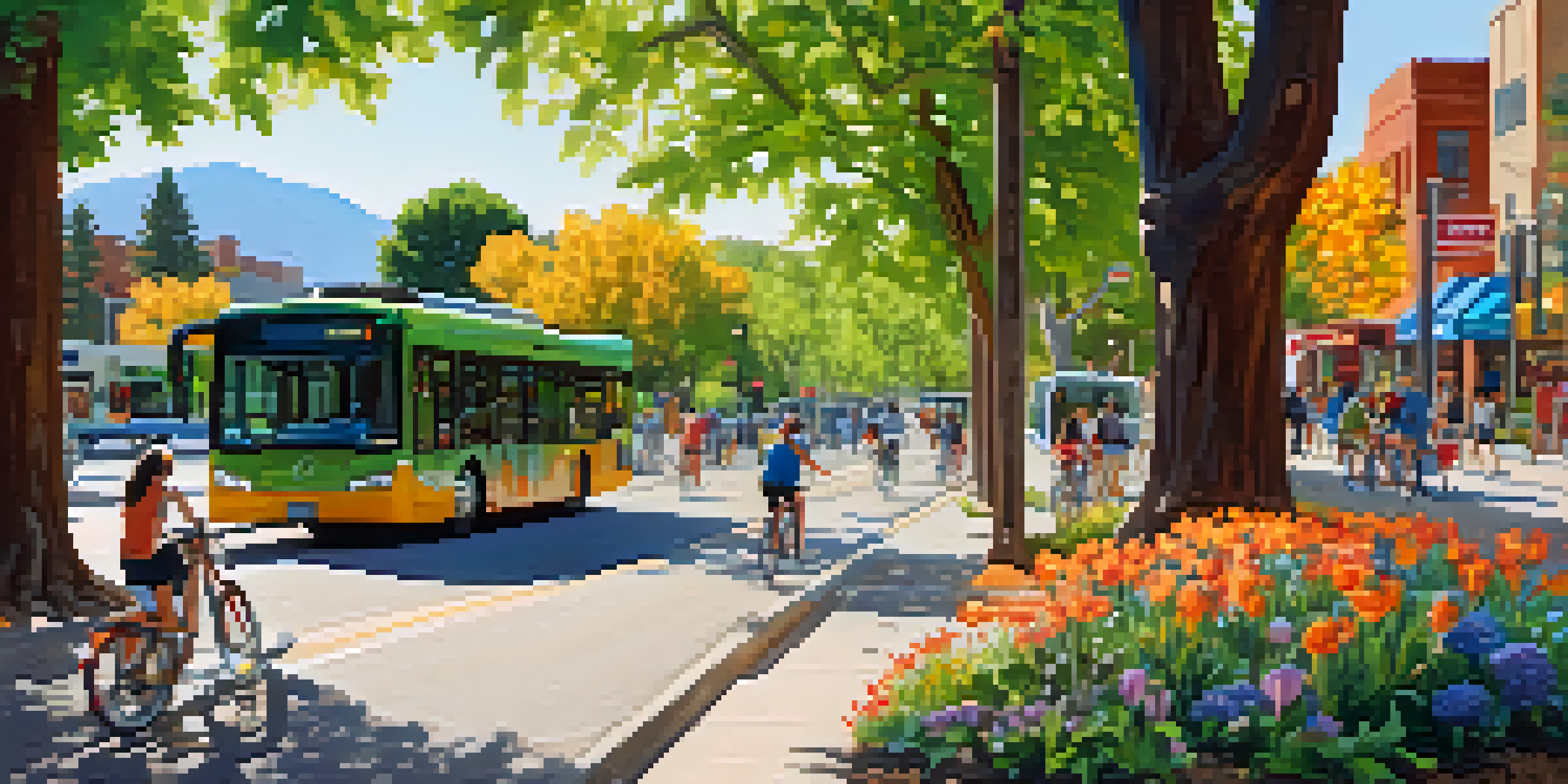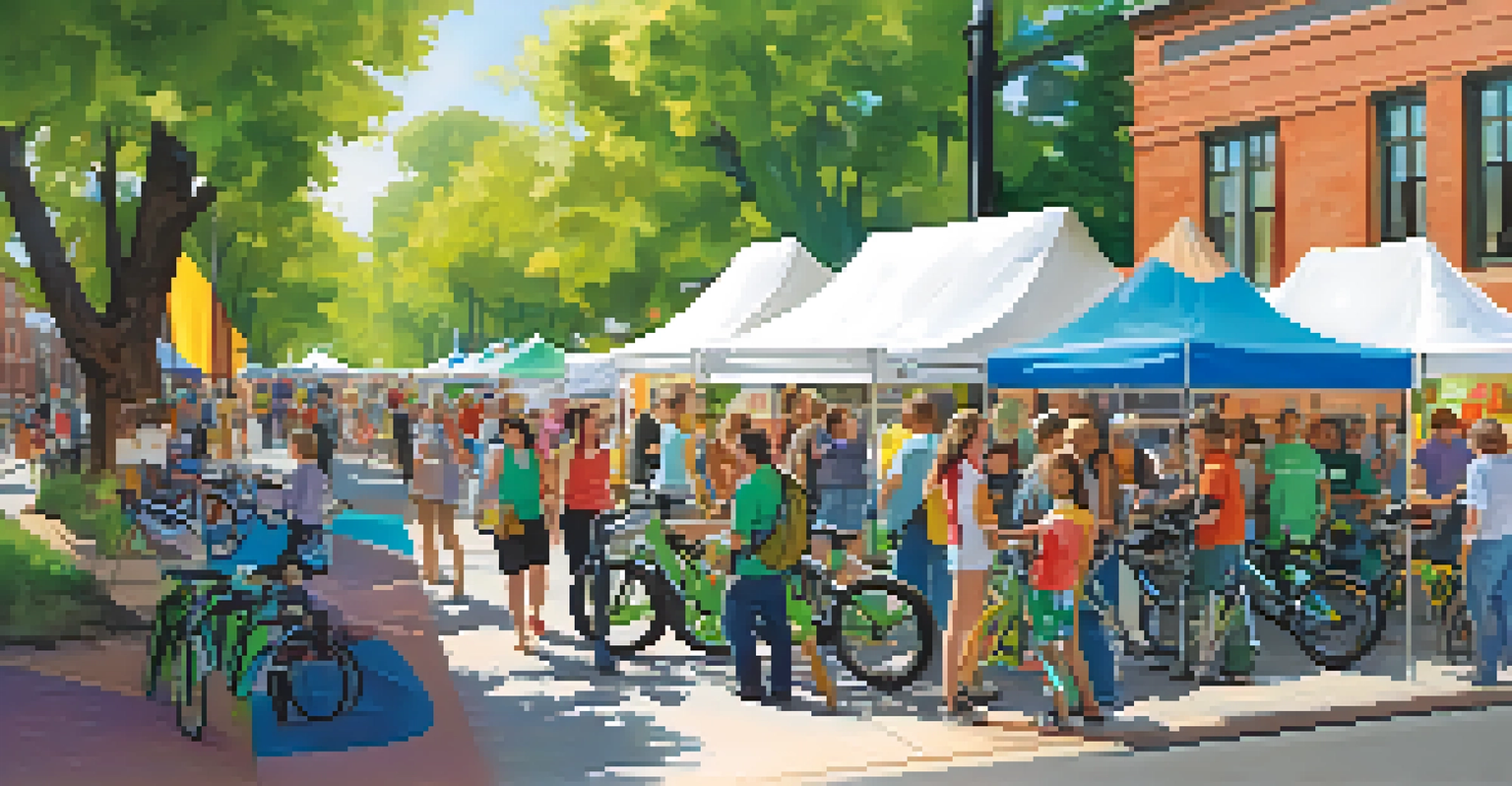Sustainable Transportation: Boulder's Green Mobility Solutions

Understanding Sustainable Transportation in Boulder
Sustainable transportation encompasses various strategies that reduce environmental impact while improving mobility. In Boulder, this means creating a system that supports biking, walking, public transit, and electric vehicles. The goal is to foster a community where people can travel efficiently without relying solely on cars.
Sustainable transportation is not just about the environment; it's about creating a higher quality of life for everyone in the community.
Boulder has made significant strides in adopting sustainable practices, which are crucial for combating climate change. By integrating green technology and promoting eco-friendly habits, the city aims to create a cleaner and healthier environment for residents and visitors alike. This approach not only benefits the planet but also enhances the quality of life in the community.
As we explore Boulder's green mobility solutions, it's essential to recognize that these initiatives are about more than just transportation; they represent a shift in how we think about urban living. By prioritizing sustainable options, Boulder is setting an example for other cities to follow, showcasing that a greener future is not just possible but also practical.
The Role of Public Transit in Boulder’s Green Strategy
Public transit serves as a backbone for Boulder's sustainable transportation system. The city offers a robust bus network that connects various neighborhoods and key destinations, reducing the need for personal vehicles. These services not only make commuting more accessible but also encourage residents to leave their cars at home.

Boulder's public transit system emphasizes eco-friendly options, with many buses operating on compressed natural gas or electricity. This commitment to cleaner energy sources aligns with broader goals of reducing greenhouse gas emissions. For residents, this translates to a more reliable and environmentally friendly way to navigate the city.
Boulder Prioritizes Eco-Friendly Transit
Boulder is enhancing its transportation system by focusing on biking, walking, public transit, and electric vehicles to reduce environmental impact.
Moreover, the city's transit initiatives include incentives for using public transport, such as discounts and partnerships with local businesses. By making public transit a more attractive option, Boulder encourages a cultural shift towards shared mobility. This shift not only eases traffic congestion but also fosters a sense of community among residents.
Biking: Boulder's Favorite Green Mobility Option
Biking has become a hallmark of sustainable transportation in Boulder, with an extensive network of bike paths and lanes. The city's commitment to cycling is evident in its investments in infrastructure that prioritize safety and accessibility for cyclists. This makes biking an appealing alternative to driving.
The future belongs to those who believe in the beauty of their dreams.
Programs like 'Bike Boulder's' initiatives have further popularized cycling, offering residents resources and support for biking in their daily lives. These programs include bike-sharing options and educational workshops that encourage safe riding habits. As a result, biking not only promotes personal health but also contributes to reducing traffic and pollution.
Boulder's beautiful landscapes and favorable weather conditions create an inviting atmosphere for cyclists. Whether commuting to work or enjoying leisure rides, the city’s bike culture fosters a sense of community and environmental awareness. This vibrant biking culture illustrates how sustainable transportation can be both practical and enjoyable.
Walking: Promoting Pedestrian-Friendly Spaces
Walking is another crucial component of Boulder's sustainable transportation strategy. The city prioritizes pedestrian-friendly designs, ensuring that sidewalks, crosswalks, and public spaces are easily accessible. This approach not only encourages walking but also enhances the overall urban experience.
Boulder's commitment to walkability is evident in initiatives like the 'Walk and Roll' program, which promotes walking and biking for short trips. These initiatives aim to raise awareness about the benefits of non-motorized travel, encouraging residents to incorporate walking into their daily routines. As more people opt to walk, the community becomes healthier and more connected.
Community Engagement Drives Change
Active participation from residents ensures that Boulder’s sustainable transportation initiatives resonate with community needs and values.
Additionally, pedestrian events and community activities highlight the importance of walking in urban life. By fostering a culture that values pedestrian mobility, Boulder reinforces its commitment to sustainability. This not only makes the city more livable but also aligns with broader environmental goals.
Electric Vehicles: A Cleaner Alternative
Electric vehicles (EVs) are gaining traction in Boulder as part of the city's green mobility solutions. With a growing number of charging stations and incentives for EV ownership, Boulder is positioning itself as a leader in clean transportation. These efforts aim to reduce reliance on fossil fuels and decrease air pollution.
The city has implemented programs to support EV adoption, including tax rebates and public awareness campaigns. By making EVs more accessible and affordable, Boulder encourages residents to choose cleaner alternatives for their transportation needs. This transition not only benefits individual drivers but also contributes to the city's overall sustainability goals.
Moreover, Boulder is exploring innovative solutions like electric bike-sharing programs to further promote eco-friendly transport options. These initiatives demonstrate the city's commitment to embracing technology in the pursuit of greener solutions. With a focus on electric mobility, Boulder aims to create a sustainable transportation ecosystem for future generations.
Community Engagement in Sustainable Transportation
Community engagement plays a pivotal role in Boulder’s sustainable transportation efforts. The city actively seeks input from residents to develop initiatives that resonate with their needs and preferences. By involving the community, Boulder ensures that its mobility solutions are not only effective but also widely accepted.
Programs like 'Boulder Moves' exemplify this engagement, offering platforms for residents to voice their opinions on transportation issues. These forums foster dialogue and collaboration between city officials and citizens, leading to more informed decision-making. Ultimately, this participatory approach strengthens community bonds and promotes a shared vision for sustainability.
Challenges Ahead for Sustainable Growth
As Boulder grows, it faces challenges in providing equitable access to sustainable transportation options while maintaining its environmental goals.
Through workshops, surveys, and outreach events, Boulder cultivates a culture of sustainability. By empowering residents to play an active role in shaping their transportation landscape, the city promotes ownership and responsibility for environmental stewardship. This engagement is vital for creating a sustainable future that reflects the values of the community.
Future Challenges and Opportunities for Boulder
While Boulder has made impressive strides in sustainable transportation, challenges remain. As the population grows, so does the demand for efficient and accessible mobility options. Balancing development with sustainability will require innovative thinking and adaptive strategies to meet the needs of a changing landscape.
Furthermore, addressing inequities in transportation access is a critical challenge. Ensuring that all residents, regardless of socioeconomic status or location, can benefit from sustainable options is vital for fostering an inclusive community. Boulder must continue to explore solutions that bridge these gaps and promote equitable mobility.

Looking ahead, Boulder has the opportunity to further enhance its green transportation initiatives by embracing emerging technologies and collaborative partnerships. By leveraging advancements in smart transit systems and engaging with local businesses and organizations, the city can continue to lead the way in sustainable mobility. The future of Boulder's transportation landscape is bright, and with continued innovation, it can become a model for cities everywhere.
Conclusion: Boulder's Path Towards Sustainable Mobility
Boulder's commitment to sustainable transportation is evident in its comprehensive approach that includes public transit, biking, walking, and electric vehicles. By prioritizing these green mobility solutions, the city not only addresses environmental concerns but also enhances the quality of life for its residents. This holistic strategy sets a standard for other cities to aspire to.
The ongoing engagement of the community in shaping transportation policies ensures that Boulder's initiatives align with the values and needs of its residents. As the city navigates future challenges, its focus on sustainability will foster a resilient and connected community. This collaborative spirit is essential for creating a shared vision of mobility that benefits everyone.
In conclusion, Boulder's journey towards sustainable transportation exemplifies how cities can balance growth and environmental stewardship. With continued innovation and community involvement, Boulder is poised to remain at the forefront of green mobility solutions, paving the way for a more sustainable future.